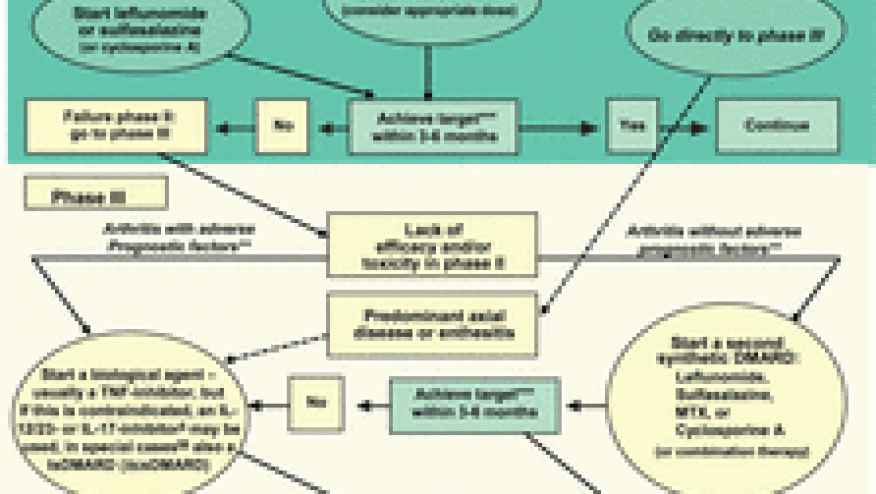EULAR 2015 Psoriatic Arthritis Treatment Guidelines Save

The management of psoriatic disease, including psoriatic arthritis (PsA) has evolved significantly in the last decade. Nevertheless, there are still some uncertainties - such as what the role of methotrexate should be, and when to use newer and novel therapies.
Moreover, the unique manifestations of PsA also need to be managed with an expanding array of DMARDs and biologics. Thus, with more novel therapies emerging every year, there is need for revision of treatment recommendations and guidelines.
Additional evidence on agents recently approved for treatment of PsA and treat-to-target recommendations have been developed for PsA since the publication of the EULAR PsA management recommendations in 2012.
New 2015 treatment recommendations outline following 10 recommendations:
- Aim at achieving remission or minimal disease activity, by frequent monitoring and frequent adjustment of therapy;
- NSAIDs may be used for symptomatic relief;
- For active peripheral arthritis, consider csDMARDs early on, with MTX being preferred for patients with relevant skin disease;
- Systemic steroids should be used with caution in lowest possible dose, Intraarticular steroids may me added to systemic DMARDs;
- Biologic DMARDs, usually TNF inhibitors, shall be consider for patients with peripheral arthritis who failed at least one csDMARD;
- If a TNF inhibitor is not appropriate, consider IL-12/23 or IL-17 inhibitor for patients with peripheral arthritis and one csDMARD failure;
- If a TNF inhibitor or IL-12/23 or an IL-17 inhibitor is not appropriate, consider a PDE-4 inhibitor (apremilast) as bDMARD of choice;
- For active enthesitis and/or dactylitis and insufficient response to NSAIDs or local glucocorticoid injections, consider TNF inhibitor as a first bDMARD of choice;
- In patients with predominantly axial disease that is active and has insufficient response to NSAIDs, a TNF inhibitor shall be used as a bDMARD of choice (csDMARDs not recommended);
- In patients who failed a bDMARD, switching to another bDMARD should be considered, including switching between TNF inhibitors.











If you are a health practitioner, you may Login/Register to comment.
Due to the nature of these comment forums, only health practitioners are allowed to comment at this time.